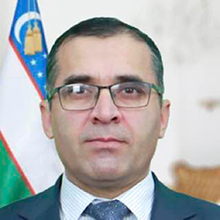
Gender Issues in Contemporary Uzbekistan  Roxila Mardonkulovna Usmanova, Doctoral Student, Institute of Family and Gender Research, Republic of Uzbekistan Roxila Mardonkulovna Usmanova, Doctoral Student, Institute of Family and Gender Research, Republic of Uzbekistan
Special attention is being paid to further enhancing the status of women in the new Uzbek society and ensuring their rights as a priority value. Gender equality is recognized as a social phenomenon that permeates all aspects of the life and activities of society, encompassing politics, economics, law, ideology, culture, education, and science, shaping the dynamics between women and men. In the words of the President of the Republic of Uzbekistan, Shavkat Mirziyoev, "The stereotype formed in the minds of our people makes me think about many things. Traditionally, we perceive a woman first and foremost as a mother, a keeper of the family hearth. This is undoubtedly true. However, today not every woman should not be just an observer, she should be an active and proactive participant in the democratic changes taking place in the country." Therefore, it can be asserted without exaggeration that in recent years, increasing the political, social, and economic engagement of women in Uzbek society has emerged as a top priority of state policy, driven by the political will of the Uzbekistani leadership.
READ MORE
- EGF Editor |
Published on EGF: 05.06.2024
| Security
-
Human resources development and management system in new Uzbekistan  The ongoing reform to enhance the democratic state governance system in New Uzbekistan is being implemented under the principle of "The state serves the people, not vice versa." The ongoing reform to enhance the democratic state governance system in New Uzbekistan is being implemented under the principle of "The state serves the people, not vice versa."
Indeed, today, social advancement is inseparable from the consolidation of the state, fostering active societal engagement, shaping positive attitudes of the state servant towards society, serving the people, ensuring individual satisfaction, promoting honesty, and establishing justice, all of which are essential in modernizing social progress. The enactment of the Law "On Public Service" represents another example of the people-oriented policy pursued by our President.
READ MORE
- EGF Editor |
Published on EGF: 24.05.2024
| Security
-
Russian withdrawal from Karabakh allows Azerbaijan to strengthen its ties with its Turkic "family"  By Vasif HUSEYNOV, PhD, Head of Department, AIR Center, Adjunct Lecturer, ADA and Khazar Universities, Baku By Vasif HUSEYNOV, PhD, Head of Department, AIR Center, Adjunct Lecturer, ADA and Khazar Universities, Baku
The geopolitics of the South Caucasus is as unpredictable as ever. Even as recently as the beginning of April, few, if any, would have imagined that Russia may withdraw its peacekeeping contingent from the Karabakh region of Azerbaijan anytime soon. Many observers were even sceptical about the possibility of their withdrawal in November 2025 – the date which was stipulated in the November 2020 trilateral statement as the potential but not fixed date for the ending of the peacekeeping mission of Russia. This skepticism was grounded in the understanding that for Russia, Karabakh holds paramount importance in the broader context of the South Caucasus.
READ MORE
- EGF Editor |
Published on EGF: 14.05.2024
| Security
-
Conflict in the South Caucasus and the Middle East  By Alan WHITEHORN, Professor Emeritus in Political Science, The Royal Military College of Canada By Alan WHITEHORN, Professor Emeritus in Political Science, The Royal Military College of Canada
Armenia and the South Caucasus were historically parts of the former Soviet Union, and are often considered, in geopolitical terms, to be in the so-called Moscow-influenced “Russia’s near abroad”. It might be useful, however, to recognize the significant connections of the South Caucasus to the Middle East. In fact, Armenia is relatively close geographically (under 1,000 km) to each of the capital cities of Teheran (Iran), Baghdad (Iraq), and Ankara (Turkiye) and not much farther from Israel and Lebanon (under 1,300 km). In terms of international affairs and recent conflict Turkey has been a crucial military ally of Azerbaijan during the latter’s wars with Armenia and Nagorno-Karabakh (Artsakh) in 2020 and 2023. A lesser-known fact is that, over the previous decade, Israel has been a major weapons’ supplier of Azerbaijan, particularly advanced drones that proved critical for Baku’s swift and decisive victory in the 2020 Armenia-Azerbaijan war, and its 2023 recapture of Nagorno-Karabakh, which displaced over 100,000 civilians, virtually all of the local Armenian population. READ MORE
- EGF Editor |
Published on EGF: 14.05.2024
| Security
-
What Is at Stake in the Tavush Region?  By Benyamin POGHOSYAN, PhD, Chairman, Center for Political and Economic Strategic Studies By Benyamin POGHOSYAN, PhD, Chairman, Center for Political and Economic Strategic Studies
Since Prime Minister Nikol Pashinyan’s March 18 visit to Voskepar and Kiranc villages in the Tavush region, discussions and debates have been underway in Armenia on the situation along the Armenia – Azerbaijan border in that region. The visit took place after the statement of the office of Azerbaijan’s Deputy Prime Minister Shahin Mustafayev, demanding the immediate return of “four non-enclave Azerbaijani villages’” located in Tavush along the Armenia – Azerbaijan border to Azerbaijan which were in principle covered in the demarcation and delimitation negotiations. During his meetings with villagers, the Armenian prime minister stated that “the process of delimitation and demarcation between Armenia and Azerbaijan was entering the practical stage.” Despite acknowledging that there were no agreements on maps and principles of the process and that Azerbaijan would not leave the Armenian territories currently under its control, the prime minister argued for withdrawing from those villages to avoid a new war. After these meetings, some representatives of the Armenian leadership, including the speaker of the National Assembly, started to state that those territories were not part of Armenia and should be returned to Azerbaijan.
READ MORE
- EGF Editor |
Published on EGF: 05.04.2024
| Security
-
What Does a Recent ISIS-K Terror Attack Mean for Turkey?
 By Fuad Shahbazov, Baku-based independent regional security and defence analyst By Fuad Shahbazov, Baku-based independent regional security and defence analyst
On January 28, 2024, masked assailants attacked a Roman Catholic church in Istanbul, killing one person. Shortly afterward, the Islamic State, through its official Amaq News Agency, claimed responsibility. Turkish police detained 47 people, most Central Asian nationals. The incident shed light on the growing presence in Turkey of a Central Asian offshoot of the Islamic State group known as ISIS-K for Khorasan, once a large portion of the Persian Empire now divided among Iran, Afghanistan, and Central Asian states. The January 28 assault was the group’s first successful attack in Turkey since January 1, 2017, when jihadists invaded an Istanbul nightclub, killing 39 people and wounding nearly 80.
Since then, Turkish security forces have launched mass counter-operations against ISIS suspects in Turkey, Syria, and Iraq. The operations appear to have deterred deadly terrorist attacks in large urban and border areas and to have depleted the militants’ financial resources. With the U.S. withdrawal from Afghanistan in 2021, ISIS-K suspended overseas activities to focus more on Afghanistan and try to undermine the Taliban, which resumed control over the country after the Americans left. READ MORE
- EGF Editor |
Published on EGF: 20.03.2024
| Security
-
Is Azerbaijan Interested in Peace?  By Benyamin POGHOSYAN, PhD, Chairman, Center for Political and Economic Strategic Studies By Benyamin POGHOSYAN, PhD, Chairman, Center for Political and Economic Strategic Studies
After the military takeover of Nagorno-Karabakh by Azerbaijan in September 2023 and the forced displacement of the Armenians who lived there, there were hopes in Armenia and abroad that an Armenia-Azerbaijan peace agreement was within reach. These hopes were based on the assumption that Azerbaijan had achieved its primary objective for the past 30 years: the full absorption of Nagorno-Karabakh into Azerbaijan without any Armenian claims over the region.
Since September 2023, Azerbaijan has controlled all of Nagorno-Karabakh, with only a handful of Armenians remaining there. The Armenian government has accepted this reality and has no intention of challenging it. Meanwhile, Azerbaijan has faced no repercussions from the US, the EU, or Russia for imposing a blockade on Nagorno-Karabakh in December 2022, ignoring the orders of the International Court of Justice, launching a military attack in September 2023, or forcing all Armenians to leave the region. It seemed that the time for peace had thus arrived – a peace that would formalize Azerbaijani control over Nagorno-Karabakh, settle relations with Armenia, and open the way for the normalization of relations between Armenia and Turkey.
READ MORE
- EGF Editor |
Published on EGF: 05.03.2024
| Security
-
Uzbekistan is creating its own model for combating corruption  Qodir Djuraev, MP, Legislative Chamber of Oliy Majlis (national parliament) of the Republic of Uzbekistan
Qodir Djuraev, MP, Legislative Chamber of Oliy Majlis (national parliament) of the Republic of Uzbekistan
One of the most crucial issues in the rapidly changing world is undoubtedly corruption. The human history suggests that this phenomenon brought even the most powerful nations to the brink of collapse.
Corruption is a perilous misfortune with negative impact on the entire human race, on foundation of any state and society, economic development; it undermines rule of law and sharply weakens public confidence in government, hinders advancement of democratic institutions.
Unfortunately, this problem has not been alien Uzbekistan. Until very recently, the latter had been known as one of those countries with highest perceptions of corruption.
READ MORE
- EGF Editor |
Published on EGF: 09.02.2024
| Security
-
The likeliest scenarios for tomorrow’s Russia  By Marat Terterov, PhD, Founder, and former Executive Director of the EGF By Marat Terterov, PhD, Founder, and former Executive Director of the EGF
The folly of predicting Russia’s future
When undertaking the task of seeking to forecast a ‘likely scenario’ for tomorrow’s Russia, one has to start with a caveat – predicting Russia’s future and what fate awaits the country in light of its continued military excursion in Ukraine is like trying to find a needle in a haystack. In other words, it is almost impossible to predict future political developments in Russia with any real certainty. This includes any efforts to predict whether Russia will continue to remain the arch belligerent in Ukraine, or whether it will be prepared to make concessions, or to forecast what impact either (or other) of these developments in the current conflict in Ukraine will have on the Russian regime of Vladimir Putin.
READ MORE
- EGF Editor |
Published on EGF: 06.02.2024
| Security
-
Will an Armenia-Azerbaijan peace agreement be indefinitely delayed?  By Vasif HUSEYNOV, PhD, Head of Department, AIR Center, Adjunct Lecturer, ADA and Khazar Universities, Baku By Vasif HUSEYNOV, PhD, Head of Department, AIR Center, Adjunct Lecturer, ADA and Khazar Universities, Baku
2023 ended with positive notes for the Armenia-Azerbaijan peace process, but the new year has so far failed to maintain the momentum. Despite a successful prisoner exchange, and Armenia’s endorsement of Azerbaijan’s COP29 candidacy, recent statements from the respective governments have presented a mixed picture. While the Azerbaijani side has not indicated any setbacks in the ongoing talks yet, the Armenian government has criticized the recent statements by the Azerbaijani leader as unconstructive for the peace process.
Complicating matters further, disagreements have intensified regarding the possible regulations along the Zangezur corridor. The latest developments highlight a disparity in the visions of Russia, Armenia, and Azerbaijan for this corridor. Unfortunately, these developments suggest that the obstacles in the Armenia-Azerbaijan peace treaty talks may be more fundamental, potentially leading to indefinite delays in the process.
READ MORE
- EGF Editor |
Published on EGF: 06.02.2024
| Security
-
|
|
